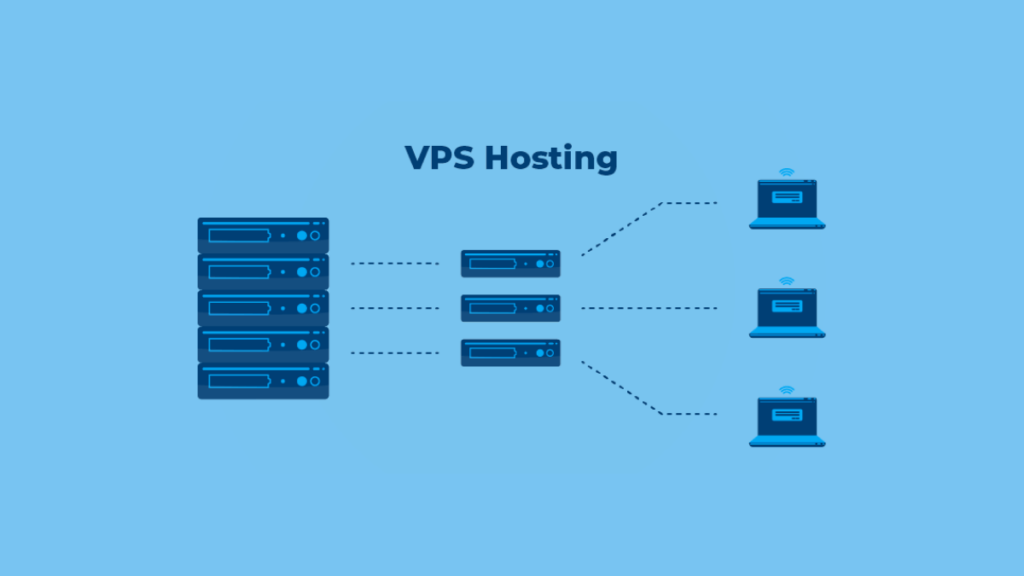Table of Contents
If you are planning to launch a website, one of the most important decisions you need to make is choosing a web hosting service. Web hosting is the process of storing and serving your website’s files to visitors who enter your domain name. However, not all web hosting services are the same. There are different types of web hosting that offer different features, performance, security and pricing.
In this blog post, we will explain the difference between four common types of web hosting: shared hosting, VPS hosting, dedicated hosting and managed hosting. We will also help you decide which one is best for your website based on your needs, budget and goals.
What is Shared Hosting?

Shared hosting is the most popular and affordable type of web hosting. It allows multiple users to host their websites on a single server by sharing its resources, such as CPU, RAM, disk space and bandwidth. This way, web hosts can offer low-cost plans to their customers.
Shared hosting is suitable for small businesses, portfolios, informational websites and personal websites that have low to moderate traffic and do not require much customization or advanced features.
Some of the benefits of shared hosting are:
- Easy to use: You do not need to have any technical skills or knowledge to set up and manage your website on a shared server. Most web hosts provide user-friendly control panels, such as cPanel or Plesk, that let you install applications, manage files, create email accounts and more with a few clicks.
- Affordable: You can host your website for as low as $2 per month on some shared hosting plans. You also do not need to pay for any additional hardware or software licenses.
- Scalable: You can easily upgrade or downgrade your plan as your website grows or shrinks. Most web hosts offer flexible plans that let you change your resources and features without any hassle.
However, shared hosting also has some drawbacks that you need to be aware of:
- Limited resources: Since you are sharing the server with other users, you may experience slow performance, downtime or errors if the server is overloaded or if another user consumes too much resources. You also have limited control over the server configuration and settings.
- Security risks: Sharing a server with other users also means sharing the same IP address and security vulnerabilities. If another user’s website gets hacked or infected with malware, it may affect your website as well. You also have less protection from cyberattacks and spam than on other types of web hosting.
- Lack of customization: You cannot install or modify any software or applications that are not supported by your web host on a shared server. You also have limited access to the server logs and statistics.
Some of the best shared hosting providers are:
- Bluehost: One of the most popular and reliable web hosts in the industry. They offer fast and secure shared hosting plans with a free domain name, SSL certificate, WordPress installation and 24/7 support. Their plans start from $2.95 per month.
- Hostinger: A budget-friendly web host that offers cheap and fast shared hosting plans with a free domain name, SSL certificate, WordPress installation and 24/7 support. Their plans start from $0.99 per month.
- InMotion Hosting: A reputable web host that offers high-performance and feature-rich shared hosting plans with a free domain name, SSL certificate, WordPress installation and 24/7 support. Their plans start from $3.99 per month.
What is VPS Hosting?

VPS hosting stands for Virtual Private Server hosting. It is a type of web hosting that offers more power and flexibility than shared hosting by creating multiple virtual servers on a single physical server. Each virtual server acts as a dedicated server with its own resources, operating system and software.
VPS hosting is suitable for medium to large websites that have high traffic and require more customization and control over their server environment.
Some of the benefits of VPS hosting are:
- Dedicated resources: You get a guaranteed amount of CPU, RAM, disk space and bandwidth for your website on a VPS. You do not have to share them with other users or worry about them being depleted by other websites on the same server.
- Customization: You have full root access to your VPS, which means you can install or modify any software or applications that you want on your server. You can also choose your preferred operating system (Linux or Windows) and control panel (cPanel or Plesk).
- Security: You have a higher level of security and privacy on a VPS than on a shared server. You have your own IP address and firewall that protect your website from cyberattacks and spam. You can also implement additional security measures, such as SSL certificates, backups and malware scanning.
However, VPS hosting also has some drawbacks that you need to be aware of:
- Cost: VPS hosting is more expensive than shared hosting. You need to pay for the resources and features that you use on your VPS. You also need to pay for any additional hardware or software licenses that you need.
- Technical skills: You need to have some technical skills or knowledge to set up and manage your website on a VPS. You need to be familiar with the server configuration and settings, as well as the software and applications that you install on your server. You may also need to troubleshoot any issues that arise on your server.
- Maintenance: You are responsible for maintaining and updating your VPS regularly. You need to ensure that your server is running smoothly and securely, as well as perform backups and restore them if needed.
Some of the best VPS hosting providers are:
- HostGator: A well-known and trusted web host that offers fast and reliable VPS hosting plans with full root access, free SSL certificate, free cPanel or Plesk control panel and 24/7 support. Their plans start from $19.95 per month.
- DreamHost: A reputable and award-winning web host that offers high-performance and scalable VPS hosting plans with full root access, free SSL certificate, free WordPress installation and 24/7 support. Their plans start from $10 per month.
- A2 Hosting: A fast and secure web host that offers turbo-charged and optimized VPS hosting plans with full root access, free SSL certificate, free cPanel or Plesk control panel and 24/7 support. Their plans start from $5 per month.
What is Dedicated Hosting?

Dedicated hosting is the most powerful and expensive type of web hosting. It allows you to rent an entire physical server for your website only. You have full access and control over the server’s resources, operating system and software.
Dedicated hosting is suitable for large websites that have very high traffic and require maximum customization and security over their server environment.
Some of the benefits of dedicated hosting are:
- Full resources: You get the entire CPU, RAM, disk space and bandwidth of the server for your website only. You do not have to share them with anyone else or worry about them being affected by other websites on the same server.
- Full customization: You have full root access to your dedicated server, which means you can install or modify any software or applications that you want on your server. You can also choose your preferred operating system (Linux or Windows) and control panel (cPanel or Plesk).
- Full security: You have the highest level of security and privacy on a dedicated server than on any other type of web hosting. You have your own IP address and firewall that protect your website from cyberattacks and spam. You can also implement additional security measures, such as SSL certificates, backups and malware scanning.
However, dedicated hosting also has some drawbacks that you need to be aware of:
- Cost: Dedicated hosting is the most expensive type of web hosting. You need to pay for the entire server rental, as well as any additional hardware or software licenses that you need.
- Technical skills: You need to have advanced technical skills or knowledge to set up and manage your website on a dedicated server. You need to be familiar with the server configuration and settings, as well as the software and applications that you install on your server. You may also need to troubleshoot any issues that arise on your server.
- Maintenance: You are responsible for maintaining and updating your dedicated server regularly. You need to ensure that your server is running smoothly and securely, as well as perform backups and restore them if needed.
Some of the best dedicated hosting providers are:
- Liquid Web: A premium and professional web host that offers fully managed dedicated hosting plans with full root access, free SSL certificate, free cPanel or Plesk control panel, free migrations and 24/7 support. Their plans start from $169 per month.
- InMotion Hosting: A reputable web host that offers high-performance dedicated hosting plans with full root access, free SSL certificate, free cPanel or Plesk control panel, free migrations and 24/7 support. Their plans start from $105.69 per month.
- HostGator: A well-known and trusted web host that offers fast and reliable dedicated hosting plans with full root access, free SSL certificate, free cPanel or Plesk control panel, free migrations and 24/7 support. Their plans start from $89.98 per month.
What is Managed Hosting?

Managed hosting is a type of web hosting that offers a high level of service and support from the web host. It means that the web host takes care of most of the technical aspects of hosting your website, such as server setup, maintenance, security, backups, updates and more. You only need to focus on your website content and design.
Managed hosting can be applied to any type of web hosting, such as shared, VPS or dedicated hosting. However, it is most commonly associated with WordPress hosting, which is a specialized type of web hosting that is optimized for WordPress websites.
Managed hosting is suitable for website owners who do not have the time, skills or resources to manage their own web hosting. It is also ideal for websites that need high performance, security and reliability.
Some of the benefits of managed hosting are:
- Convenience: You do not need to worry about any technical aspects of hosting your website on a managed server. The web host takes care of everything for you, from server setup to updates. You can focus on your website content and design instead.
- Performance: You get a fast and optimized server for your website on a managed server. The web host ensures that your server has the latest hardware and software, as well as the best configuration and settings for your website.
- Security: You get a secure and protected server for your website on a managed server. The web host provides regular backups, malware scanning, firewall protection, SSL certificates and more for your website.
- Support: You get a high level of service and support from the web host on a managed server. The web host has a team of experts who can help you with any issues or questions that you may have regarding your website or server.
However, managed hosting also has some drawbacks that you need to be aware of:
- Cost: Managed hosting is more expensive than unmanaged hosting. You need to pay for the extra service and support that the web host provides for your website.
- Control: You have less control over your server and website on a managed server. You cannot install or modify any software or applications that are not supported by your web host on your server. You also have limited access to the server logs and statistics.
- Compatibility: You may face some compatibility issues with some plugins or themes on your website on a managed server. Some web hosts may restrict or disable some plugins or themes that may affect the performance or security of your website.
Some of the best managed hosting providers are:
- Kinsta: A premium and professional web host that offers fully managed WordPress hosting plans with fast and secure servers, free SSL certificate, free migrations, free CDN, free staging environment and 24/7 support. Their plans start from $30 per month.
- WP Engine: A leading and premium web host that offers fully managed WordPress hosting plans with fast and secure servers, free SSL certificate, free migrations, free CDN, free staging environment and 24/7 support. Their plans start from $25 per month.
- SiteGround: A popular and reliable web host that offers managed WordPress hosting plans with fast and secure servers, free SSL certificate, free migrations, free CDN, free staging environment and 24/7 support. Their plans start from $6.99 per month.
How to Choose the Right Web Hosting for Your Website?

Now that you know the difference between shared, VPS, dedicated and managed hosting, you may wonder how to choose the right one for your website. There is no definitive answer to this question, as it depends on various factors, such as:
- Your website’s purpose: What kind of website are you building? Is it a personal blog, a portfolio, an online store, a news site or something else? Different types of websites have different needs and goals.
- Your website’s traffic: How many visitors do you expect to have on your website? How much traffic do you plan to grow in the future? Different types of web hosting can handle different levels of traffic.
- Your website’s features: What kind of features do you want to have on your website? Do you need any special software or applications? Do you want to use any plugins or themes? Different types of web hosting offer different levels of customization and compatibility.
- Your budget: How much are you willing to spend on web hosting? How much value do you expect to get from your web hosting? Different types of web hosting have different prices and benefits.
As a general rule of thumb, here are some suggestions for choosing the right web hosting for your website:
- If you are just starting out with a small or simple website that does not require much customization or advanced features, go for shared hosting. It is the cheapest and easiest option for beginners.
- If you have a medium or large website that has high traffic and requires more customization and control over your server environment, go for VPS hosting. It is the most balanced and flexible option for intermediate users.
- If you have a very large or complex website that has very high traffic and requires maximum customization and security over your server environment, go for dedicated hosting. It is the most powerful and expensive option for advanced users.
- If you do not have the time, skills or resources to manage your own web hosting, or if you want to have a high-performance, secure and reliable WordPress website, go for managed hosting. It is the most convenient and hassle-free option for any user.
Conclusion
Choosing the right web hosting for your website is a crucial decision that can affect your website’s success and performance. You need to consider various factors, such as your website’s purpose, traffic, features and budget, as well as the pros and cons of each type of web hosting.
We hope that this blog post has helped you understand the difference between shared, VPS, dedicated and managed hosting, and how to choose the best one for your website. If you have any questions or need any help with your web hosting, feel free to get in touch with us. We are always happy to assist you.
Thank you for reading and happy web hosting!
